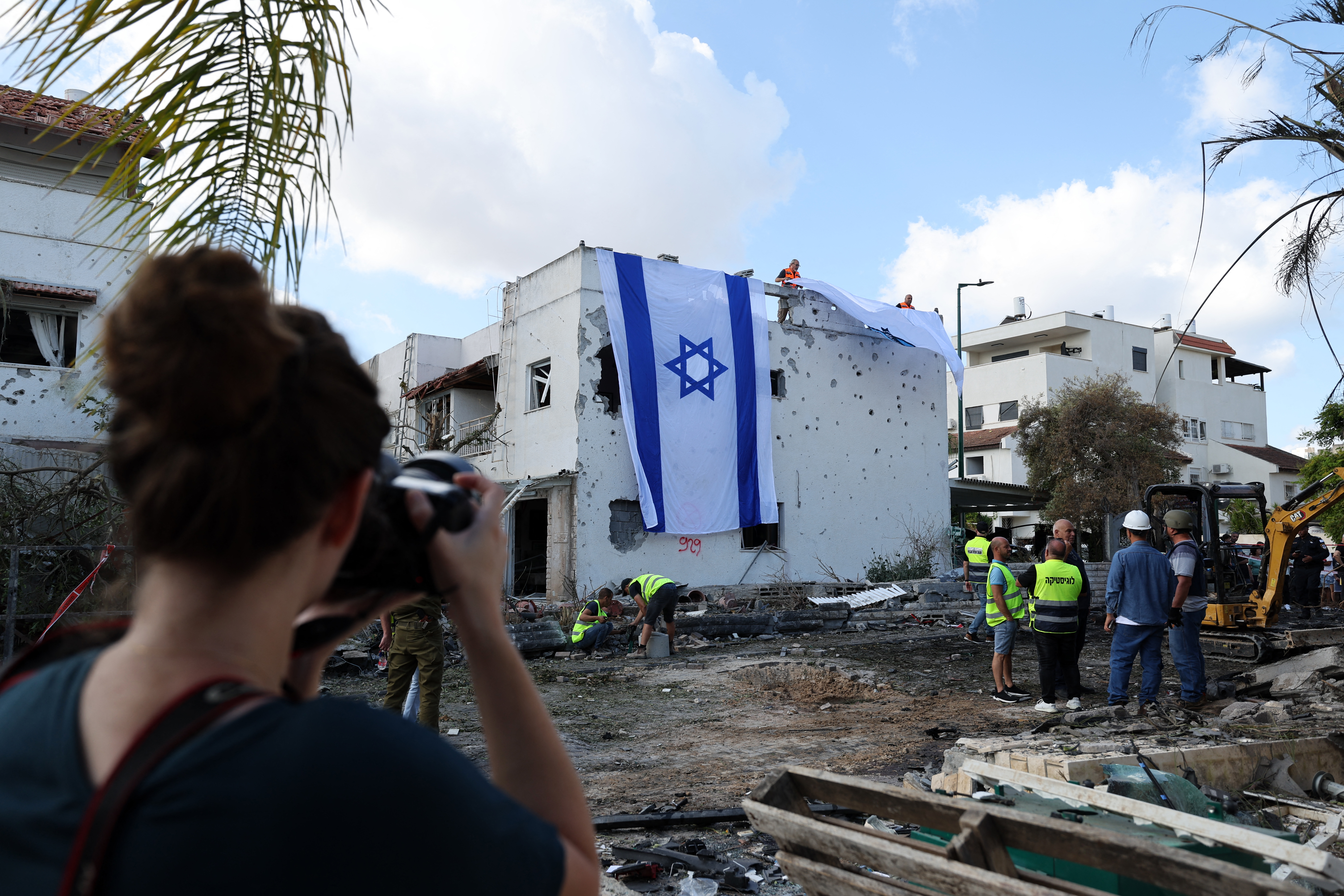Jerusalem/Haifa — Israeli Prime Minister Benjamin Netanyahu said Sunday that Israel has dealt serious blows to the Lebanese group Hezbollah, as rapidly escalating cross-border exchanges raised fears of an all-out war.
Netanyahu’s remarks follow a night of intense rocket fire at northern Israel that had sent hundreds of thousands of people to bomb shelters, according to the military, and caused damage in the area of Haifa, a major city.
“No country can tolerate attacks on its citizens”, Netanyahu said in a statement nearly a year into the Gaza war, which was sparked by Hamas’s October 7 attack on Israel and has drawn in Iran-backed groups across the region, including Hezbollah.
In his first detailed remarks since a Friday air strike on Beirut that killed Hezbollah commanders, and deadly blasts of communication devices across Lebanon earlier in the week, the prime minister said: “In recent days, we have landed a series of blows on Hezbollah that it could have never imagined.”
He did not directly mention the specific incidents.
“I assure you it will get the message”, added Netanyahu, vowing to restore safety to the country’s north and allow displaced residents to return to the border area.
The overnight rocket fire reached Kiryat Bialik on the edge of north Israel’s biggest city Haifa, leaving a building in flames, another pockmarked with shrapnel, and vehicles incinerated.
“This is not pleasant. This is war,” said Sharon Hacmishvili, a resident of the area.
Israel has signalled its intention to turn its focus to Iran-backed Hezbollah after nearly a year of cross-border fire that began in October in what Hezbollah calls support for Hamas Palestinian militants fighting Israel.
An Israeli air strike on Friday killed the head of Hezbollah’s elite Radwan Force, Ibrahim Aqil, in a densely-populated Hezbollah stronghold in south Beirut, an attack that the Lebanese health ministry left 45 dead.
Aqil’s funeral in Beirut on Sunday is expected to draw large crowds.
The Radwan Force has spearheaded Hezbollah’s ground operations, and Israel has repeatedly called for its fighters to be pushed back from the border.
“With the region on the brink of an imminent catastrophe, it cannot be overstated enough: there is NO military solution that will make either side safer,” United Nations special coordinator for Lebanon Jeanine Hennis-Plasschaert said on social media platform X.
The Israeli army said more than 150 rockets, missiles and drones had been fired at its territory during the night and early Sunday morning, most from Lebanon.
The military said it launched strikes on Hezbollah targets in southern Lebanon in response to the rocket fire and, according to spokesman Nadav Shoshani, “to prevent a larger-scale attack”.
Lebanon’s health ministry said three people were killed in separate Israeli strikes on southern areas, while Hezbollah announced two fighters had been killed.
Israel’s civil defence agency ordered all schools in the country’s north closed following the rocket fire.
“It reminds me of October 7 when everybody stayed home,” Haifa resident Patrice Wolff told AFP, referring to the day the Hamas attack started the Gaza war.
Hezbollah said it had targeted Israeli military production facilities and an air base in the Haifa area after the communication device blasts on Tuesday and Wednesday that killed 39 and wounded almost 3,000.
“In an initial response” to the explosions of the pagers and two-way radios, which it blamed on Israel, Hezbollah “bombed the Rafael military industry complexes” in northern Israel with “dozens” of rockets, the group said.
It said it targeted Ramat David airbase with Fadi-1 and Fadi-2 rockets. The site is among the deepest inside Israeli territory so far targeted, and this appeared to be the group’s first use of that rocket type during the Gaza war.
The US State Department urged Americans in Lebanon to leave the country, and Jordan on Sunday urged its nationals to do the same.
On Saturday, an Israeli military statement said Israeli aircraft “struck thousands” of rocket launchers ready to fire from southern Lebanon, while Hezbollah said it targeted at least seven military positions in northern Israel and the annexed Golan Heights with rockets.
Amin Shoumer, a local official in Saksakiyeh near south Lebanon’s Sidon city, said there was a “heavy night of Israeli strikes” that “terrified the children” and other residents.
Hezbollah chief Hassan Nasrallah acknowledged that the communication device attack was an “unprecedented” blow. He vowed that Israel — which has not commented on the blasts — would face retribution.
Months of near-daily exchanges have killed hundreds in Lebanon, mostly fighters, and dozens in Israel and the annexed Golan, forcing tens of thousands on both sides to flee their homes.
Netanyahu on Tuesday announced an expansion of the country’s war goals to include the return of northern Israeli residents.
International mediators from Qatar, Egypt and the United States have for months tried to secure a ceasefire and hostage release deal in Gaza, which diplomats repeatedly said would help calm regional tensions.
Netanyahu’s critics in Israel have accused him of dragging out the war. Thousands again gathered in Tel Aviv Saturday night demanding a deal to free captives still held in Gaza.
Hamas’s October 7 attack on Israel resulted in the deaths of 1,205 people, mostly civilians, according to an AFP tally based on Israeli official figures that include hostages killed in captivity.
Of the 251 hostages also seized by militants, 97 are still held in Gaza, including 33 the Israeli military says are dead.
Israel’s retaliatory military offensive has killed at least 41,431 people in Gaza, most of them civilians, according to figures provided by the Hamas-run territory’s health ministry. The UN has acknowledged the figures as reliable.
Civil defence rescuers in Gaza City said an Israeli strike Sunday on a school used as shelter by displaced Palestinians killed at least seven people, the latest of numerous such incidents, with the Israeli military saying it had targeted Hamas militants.








